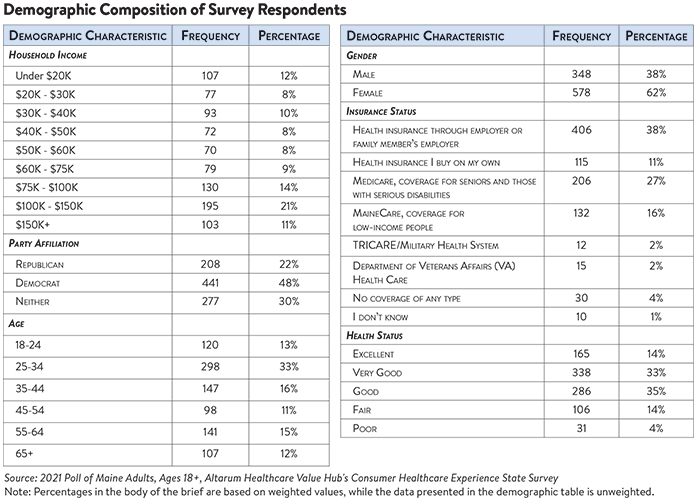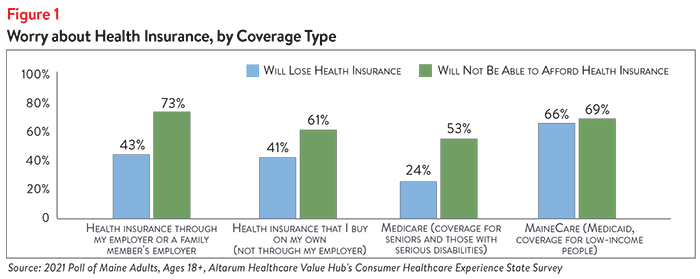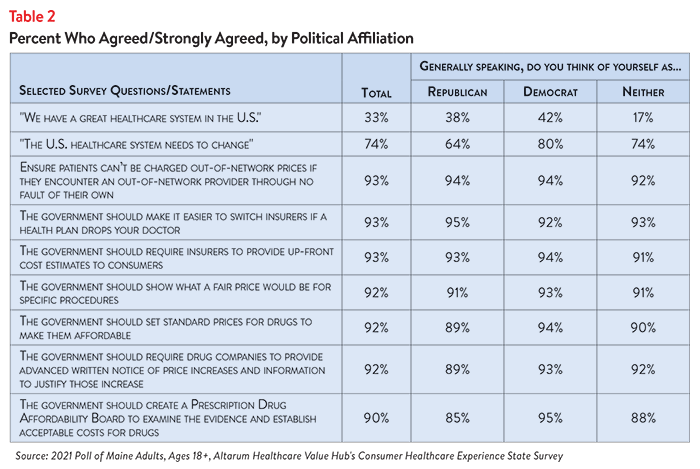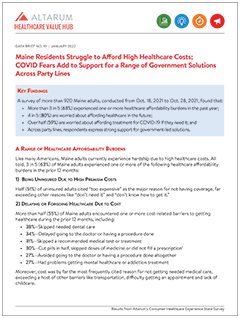Maine Residents Struggle to Afford High Healthcare Costs; COVID Fears Add to Support for a Range of Government Solutions Across Party Lines
Key Findings
A survey of more than 920 Maine adults, conducted from Oct. 18, 2021 to Oct. 28, 2021, found that:
- More than 3 in 5 (63%) experienced one or more healthcare affordability burdens in the past year;
- 4 in 5 (80%) are worried about affording healthcare in the future;
- Over half (59%) are worried about affording treatment for COVID-19 if they need it; and
- Across party lines, respondents express strong support for government-led solutions.
A Range of Healthcare Affordability Burdens
Like many Americans, Maine adults currently experience hardship due to high healthcare costs. All told, 3 in 5 (63%) of Maine adults experienced one or more of the following healthcare affordability burdens in the prior 12 months:
1) Being Uninsured Due to High Premium Costs
Half (51%) of uninsured adults cited “too expensive” as the major reason for not having coverage, far exceeding other reasons like “don’t need it” and “don’t know how to get it.”
2) Delaying or Forgoing Healthcare Due to Cost
More than half (55%) of Maine adults encountered one or more cost-related barriers to getting healthcare during the prior 12 months, including:
- 38%—Skipped needed dental care
- 34%—Delayed going to the doctor or having a procedure done
- 31%—Skipped a recommended medical test or treatment
- 30%—Cut pills in half, skipped doses of medicine or did not fill a prescription1
- 27%—Avoided going to the doctor or having a procedure done altogether
- 27%—Had problems getting mental healthcare or addiction treatment
Moreover, cost was by far the most frequently cited reason for not getting needed medical care, exceeding a host of other barriers like transportation, difficulty getting an appointment and lack of childcare.
3) Struggling to Pay Medical Bills
Other times, Maine adults got the care they needed but struggled to pay the resulting bill. Forty-two percent of Maine adults experienced one or more of these struggles to pay their medical bills:
- 21%—Contacted by a collection agency
- 14%—Unable to pay for basic necessities like food, heat or housing
- 13%—Used up all or most of their savings
- 10%—Racked up large amounts of credit card debt
- 10%—Placed on a long-term payment plan
- 9%—Borrowed money, got a loan or another mortgage on their home
Of the various types of medical bills, the ones most frequently associated with an affordability barrier were dental bills, doctor bills and prescription drugs, likely reflecting the frequency with which Maine adults seek these services—or, in the case of dental, perhaps lower rates of coverage for these services.
High Levels of Worry About Affording Healthcare in the Future
Maine adults also exhibit high levels of worry about affording healthcare in the future. Overall, 4 in 5 (80%) report being “worried” or “very worried” about affording some aspect of healthcare in the future, including:
- 69%—Cost of affording nursing home or home care services
- 67%—Medical costs when elderly
- 65%—Health insurance will become too expensive
- 65%—Medical costs in the event of a serious illness or accident
While two of the most common worries—affording the cost of nursing home or home care services and medical costs when elderly—are applicable solely to an older population, they were most frequently reported by respondents ages 45-54. This finding indicates that residents may be worried about affording the cost of care for aging parents, in addition to themselves.
Furthermore, 42% of respondents of all ages are “worried” or “very worried” about losing their health insurance. These concerns vary by type of insurance coverage, with people who have health insurance through an employer or a family member’s employer and those on Medicaid—MaineCare—being most concerned about losing their coverage. Concerns about affording health insurance exceeded fears about losing coverage across all insurance types (see Figure 1).
Demographic Differences in Healthcare Affordability Burdens
The survey also revealed differences in how Maine adults experience healthcare affordability burdens across several demographic groups.
Affordability burdens affect families quite far up the income ladder, with over half (55%) of residents with household incomes of $75,000 to $100,00 per year struggling to afford healthcare in the past 12 months (see Figure 2). Maine residents earning more than $100,000 per year and less than $50,000 per year2 face the greatest burden, with 69% and 65% reporting affordability problems, respectively.
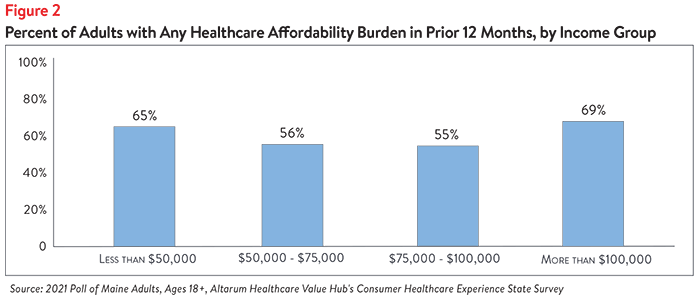
Affordability burdens predominantly affect residents ages 18-34, with 77% reporting struggling to afford healthcare in the past 12 months. Residents 55 and older are less likely to experience healthcare affordability burdens, but still, nearly 2 in 5 report struggling to afford healthcare in the past 12 months (see Figure 3).
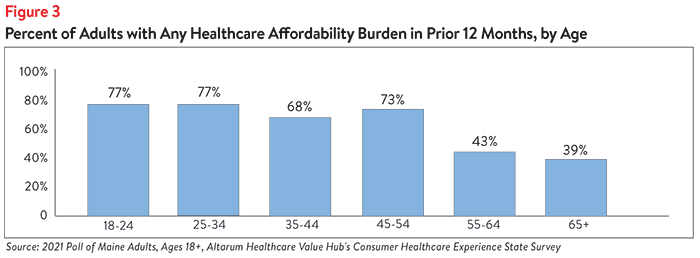
Affordability burdens affect a majority of residents, regardless of insurance status. However, those who buy insurance on their own are most likely to experience a healthcare affordability burden (73%), followed by those with MaineCare coverage (70%). While those covered by Medicare are least likely to experience an affordability burden, still over half (52%) report struggling to afford some aspect of healthcare in the past 12 months (see Figure 4).
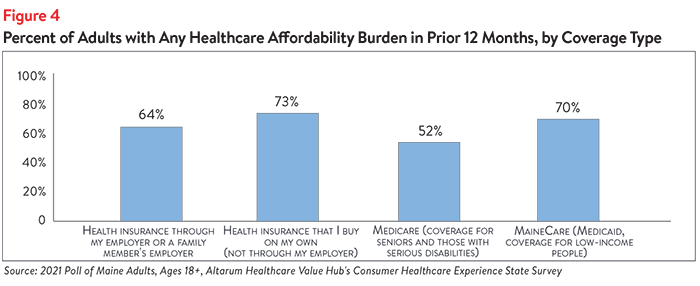
People with household incomes of less than $50,000 per year report higher levels of worry about affording healthcare costs in the future; however, even residents earning more than $100,000 per year are worried about affording coverage and care (see Table 1).
COVID Worries
In addition to affordability worries, Maine adults were asked about their top worries related to the COVID crisis.3 When asked about “affording treatment of coronavirus/COVID-19 if you need it,” 59% of respondents said they are somewhat worried or very worried.
Separately, out of twelve possible responses, respondents were asked to pick the top three things they were most worried about. “You or a family member becoming ill from the coronavirus” received the most votes, followed by “inability to get treatment for other health problems,” “struggling with anxiety/depression/other mental health issues” and “affording treatment if someone in your family gets the coronavirus,” which received similar numbers of votes.
Maine adults also worry about many other issues, including: safety at work—not getting the virus at work; job loss and resulting lack of wages; decreased value of retirement savings; children missing school/childcare; unavailability of COVID treatment if they or a family member gets sick; and job loss and resulting loss of health coverage.
Dissatisfaction with the Health System and Support for Change
In light of their healthcare affordability and COVID concerns, it is not surprising that Maine adults are generally dissatisfied with the health system. Statewide:
- Just 33% agreed or strongly agreed that “we have a great healthcare system in the U.S.,”
- While 74% agreed or strongly agreed that “the system needs to change.”
The survey asked about both personal and governmental actions to address health system problems.
Personal Actions
Maine adults see a role for themselves in addressing healthcare affordability but, far and away, view government as a key stakeholder that needs to act to address health system problems.
When asked about specific actions they could take:
- 60% of respondents reported researching the cost of a drug beforehand, and
- 76% said they would be willing to switch from a brand name to an equivalent generic drug if given the chance.
But when asked to select the top three personal actions that would be most effective in addressing healthcare affordability (out of ten possible options), top vote-getters included writing or calling their STATE representative asking them to take action (39%) and writing or calling their FEDERAL representative asking them to take action (37%).
Government Actions
Moreover, addressing healthcare problems is a top priority that Maine residents want their elected representatives to work on. At the beginning of the survey, respondents were asked what issues the government should address in the upcoming year. Healthcare received the most support, followed by the economy/joblessness and the environment/energy.
When asked about the top three healthcare priorities the government should work on, “address high healthcare costs, including prescription drugs” received the most support, followed by “improve Medicare, coverage for seniors and those with serious disabilities,” “get health insurance to those who cannot afford coverage” and “preserve consumer protections preventing people from being denied coverage or charged more for having a pre-existing medical condition.”
Of more than 20 options, Maine adults believe the reason for high healthcare costs is unfair prices charged by powerful industry stakeholders:
- 75%—Drug companies charging too much money
- 70%—Hospitals charging too much money
- 65%—Insurance companies charging too much money
When it comes to tackling costs, respondents endorsed a number of strategies, including:
- 93%—Make it easy to switch insurers if a health plan drops your doctor
- 93%—Ensure patients can’t be charged out-of-network prices if they encounter an out-of-network provider through no fault of their own
- 93%—Require insurers to provide up-front cost estimates to consumers
- 92%—Set standard prices for drugs to make them affordable
- 92%—Show what a fair price would be for specific procedures
- 92%—Require drug companies to provide advanced notice of price increases and information to justify those increases
- 90%—Create a Prescription Drug Affordability Board to examine the evidence and establish acceptable costs for drugs
Support for Action Across Party Lines
What is remarkable about these findings is high support for change regardless of respondents’ political affiliation (see Table 2).
Policies to Address COVID Concerns
In addition to their views on the policies and approaches above, respondents were asked about support for and against policies related to the COVID crisis. Out of eleven possible responses, respondents were asked to pick the top three policies that would help address COVID-related problems. There was significant diversity in the policies supported, with the highest percentages of respondents selecting “universal health coverage for all,” “improved public health emergency preparedness” and “more financial help for small businesses” as a top three priority. “More financial help for large businesses” received the least support, as it was a priority for only a small percentage of respondents.
Conclusion
The high burden of healthcare affordability, along with high levels of support for change, suggest that elected leaders and other stakeholders need to make addressing this consumer burden a top priority. Moreover, the current COVID crisis is leading state residents to take a hard look at how well health and public health systems are working for them, with strong support for a wide variety of actions. Annual surveys can help assess whether or not progress is being made.
Notes
1. Of the 55% of Maine adults who encountered one or more cost-related barriers to getting healthcare during the prior 12 months, 23% did not fill a prescription, while 21% cut pills in half or skipped doses of medicine due to cost.
2. Median household income in Maine was $57,918 (2015-2019). U.S. Census, Quick Facts. Retrieved from: U.S. Census Bureau QuickFacts: Maine
3. COVID-19 is the disease caused by the coronavirus, which was characterized as a pandemic by the World Health Organization on March 11, 2020. For a comparison of how respondents from Connecticut, Kentucky, Mississippi and New Jersey answered our COVID questions, please see Healthcare Value Hub, How COVID Has Shaped Residents’ Broader Attitudes Towards the Health System, Data Brief No. 86 (October 2020).
Survey Context
In the months and year leading up to when this survey was conducted, Mainers, along with people across the country and the world, experienced significant hardships and encountered new challenges due to the COVID-19 pandemic and the resulting public health and economic crises. However, the federal and state government took several steps that made health coverage temporarily more accessible and affordable for thousands of people in Maine in the months leading up to and during this survey.
The Families First Coronavirus Response Act temporarily increased the federal medical assistance percentage (FMAP) available for state Medicaid programs to help support states and increase access to healthcare during the COVID-19 pandemic. States accepting these funds, including Maine, have agreed to certain “maintenance of effort” (MOE) protections, including providing continuous coverage for the duration of the public health emergency, as declared by the Secretary of Health and Human Services. As a result, Maine’s Medicaid program has provided continuous coverage to everyone who was enrolled in Medicaid coverage on March 18, 2020, or who enrolled after that date. This helped to reduced churn and coverage disruptions during the year and a half leading up to this survey that would have otherwise likely caused many people, including those who experienced job and employer-sponsored coverage loss, to experience gaps in or a complete loss of coverage, or transitions in coverage to more expensive insurances with higher premiums and out-of-pocket costs.
Additional enrollment opportunities and increased financial assistance for private Marketplace coverage also became available in 2021. The American Rescue Plan Act (ARPA) reduced monthly premium costs for private Marketplace plans by temporarily increasing monthly premium subsidies for people earning less than 400 percent of the federal poverty level (FPL). ARPA also temporarily removed the income cap for subsidy eligibility, making premium subsidies newly available to people with incomes over 400 percent FPL. The additional subsidies and expanded eligibility became available on April 1, 2021 and were retroactive to the beginning of the year. Additional enhanced premium subsidies for people receiving unemployment insurance, or who had received unemployment benefits at some point during 2021, became available under ARPA on July 1, 2021. The Biden Administration also opened a Special Enrollment Period from February 15 to August 15, 2021, that allowed more Mainers to enroll in private Marketplace coverage and to take advantage of the new financial assistance available through ARPA.
Methodology
Altarum’s Consumer Healthcare Experience State Survey (CHESS) is designed to elicit respondents’ unbiased views on a wide range of health system issues, including confidence using the health system, financial burden and views on fixes that might be needed.
The survey used a web panel from Dynata with a demographically balanced sample of approximately 1,000 respondents who live in Maine. The survey was conducted in English and Spanish and was restricted to adults ages 18 and older. Respondents who finished the survey in less than half the median time were excluded from the final sample, leaving 926 cases for analysis. After those exclusions, the demographic composition of respondents was as follows, although not all demographic information has complete response rates:
